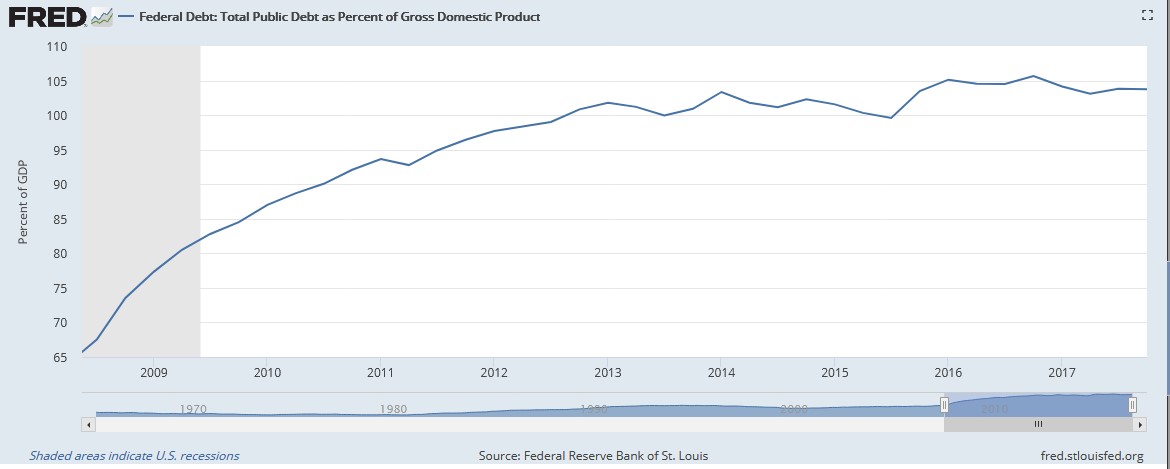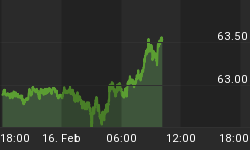U.S. public debt has increased sharply in in the post-recession period. With a gross public debt figure of $21.3 trillion (106 percent of GDP and good for 33 percent of global total), debt level is at its highest level ever since the aftermath of the Great Depression.
Some people might dismiss this as a non-issue. After all, the money is mostly owed to U.S. citizens and not to Martians. True.
Others might correctly point out that the Social Security Fund actually owns most of the national debt. At least the Social Security Trust Fund had the good sense to buy U.S. Treasuries and earn some interest instead of putting your retirement money under a giant mattress until you needed it.
Yet others might gloat in the fact that the U.S. government has never defaulted on its debt obligations.

(Click to enlarge)
Source: Federal Reserve Bank of St. Louis
Ok, here's the kicker: debt levels are about to climb to previously unchartered territory, thanks to president Trump's generous tax bonanza. According to the latest Congressional Budget Office report, public debt is set to balloon to a staggering $33 trillion in 10 years with debt held by investors reaching a size nearly as big as the entire U.S. economy.
Tax Cuts Fail to Stimulate Economy
One of the foremost objectives of lowering tax rates was that they were supposed to stimulate economic growth. Related: Samsung Loses $539 Million In Battle Against Apple
In fact, Trump has repeatedly said the cuts would pay for themselves in due time. Almost anything to keep the economy chugging along would be desirable compared to the devastation that another recession would bring.
Except … that is not what the CBO has found. According to the congressional budget report, tax cuts will add a mere 0.7 percent on average to economic growth over the next decade. That's not nearly enough to fill the hole left by lower taxes.
In turn, this will inevitably lead to a widening budget deficit. Republicans always squawked at Obama 's trillion-dollar deficits due to big-time spending on things like Obamacare, Medicare, and Medicaid. Yet, Obama's highest ever deficit was $1.3 trillion for the FY 2011, and he managed to exit office with a more manageable $585-billion deficit (though sequestration is largely to thank for that).
The report says that the U.S. federal deficit will hit $1trillion over the next 12 months. That implies that Fed's budget deficit during Trump's first term could easily exceed Obama's highest, with the CBO report saying the budget deficit is likely to expand to $1.8 trillion over the next decade thanks to the generous tax cuts.
Related: World's Top Diamond Jeweler Joins De Beers' Tracking Initiative
Overall, CBO says the budget deficit will permanently breach the $1-trillion mark by 2020 unless Congress does something quite drastic to stem the flow of red ink.
Little wonder that lawmakers mostly fell quiet on the news. Karma anyone?
A New American Exceptionalism
While the U.S. is on track to run a huge budget deficit, that's not what other major economies have in the hopper.
The IMF has forecast that of 35 major world economies, only the U.S. will see its debt-to-GDP ratio expand--by 8.9 percentage points--between 2018-2023.
The IMF is not happy about the country's debt binge and says piling debt is likely to trigger spikes in interest rates if investors start worrying about the country's ability to repay its debts. The Bretton Woods institution has also warned that heavy borrowing during good times makes it harder to do so when times are bad to combat recessions.
By Alex Kimani for Safehaven.com
More Top Reads From Safehaven.com:

















